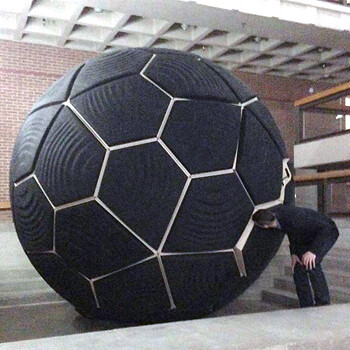February 3–March 7, 2014
Lecture: March 7, 5pm
“Primitives”: Joel Lamere (GLD Architecture) and William O’Brien, Jr. (WOJR), Assistant Professors, School of Architecture and Planning, Massachusetts Institute of Technology
Kibel Gallery
University of Maryland
Architecture Building + Art Building Atrium
College Park, MD 20742
Chamber is a spherical capsule installed in the Art Building atrium made predominantly of industrial felt. From the outside, it appears as a soft polyhedron of felt cells, evoking simultaneously the rigid geodesic domes of Buckminster Fuller and the supple symmetries of Robert Morris. Inside is a darkened anechoic chamber; the folded felt interior surface defines a soft room with deeply textured walls that inhibit visual and aural means of environmental engagement in favor of the tactile. The sphere is weighted at the bottom but un-tethered, rocking slightly with the movements of its occupants. This movement, limited within a fixed range, intensifies the inhabitants’ disorientation with respect to the outside world, adding even gravity to the set of uncertain senses. The internal reorientation—the only possible orientation—relies on imminent, physical, tactile sensorial experience.
Presented by:
The Kibel Gallery in the University of Maryland School of Architecture, Planning & Preservation aims to provide access for and exposure to creative expressions that reflect and or influence the built environment. Directed by Ronit Eisenbach, the Kibel Gallery plays a vital role in the life of the school. Exhibitions relating to the school’s four disciplines are chosen for their potential to spur dialogue about the built environment and for their celebration of exemplary professional and student work. The gallery mounts six exhibitions a year that are supplemented by gallery talks and symposia. These include exhibitions curated and designed by Maryland faculty and students as well as traveling shows borrowed from other institutions and colleagues. Maryland Architecture, Planning and Preservation (MAPP) offers a unique combination of world-class resources, interdisciplinary opportunities and intimate learning environments all situated in easy reach of Washington. The School has evolved into an academic center that is inclusive of the design, social, cultural and environmental aspects of human environments. We believe that physical design and social environment are interrelated, and that best practice and research should reflect this interconnectedness. To learn more about the Kibel Gallery and the School of Architecture, Planning & Preservation, visit arch.umd.edu.
Design | Cultures + Creativity (DCC) is one of Maryland’s premier honors programs that fosters independent thinkers and collaborative problem solvers who imagine that which does not yet exist. As a truly interdisciplinary program with undergraduate students coming from 35 various academic programs across the campus, DCC challenges traditional divisions of knowledge and expertise. We strongly value inclusivity and we embrace hybridity in both theory and practice through an innovative curriculum and a close-knit residential community where intellectual excitement, creativity, and diverse ideas are brought together to explore emerging technologies and their impact on the world through projects in in mobile media, sound and music composition, augmented reality, human-computer interaction, digital storytelling, and expanded cinema. Directed by Hasan Elahi, DCC is part of the Honors College at the University of Maryland. The Honors College, a vibrant and diverse intellectual community on the doorstep of the nation’s capital, engages the University of Maryland’s highest achieving undergraduates by providing academic challenges and boundless opportunities for discovery, setting them on paths to extraordinary futures. To learn more about the Design | Cultures + Creativity program, please visit our website at dcc.umd.edu.
Additional partners include:
Maryland Architecture, Planning and Preservation / Art Gallery / Department of Art / Honors College




